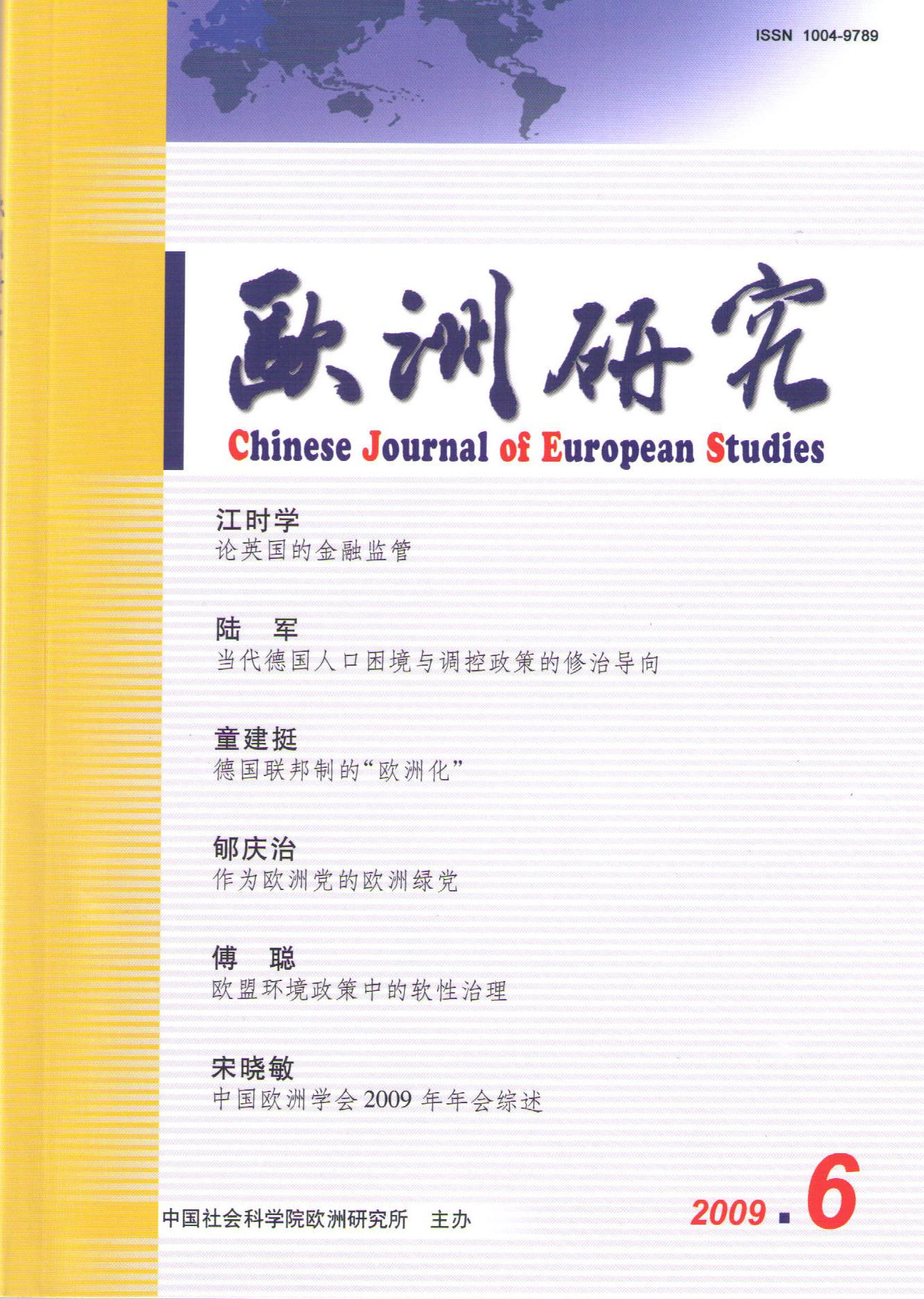Chinese Journal of European Studies No.6 ,2009
ARTICLES
1 On the Financial Regulation and Supervision in the
Since the 1980s the financial regulation and supervision in the
16 An Analysis of the Population Dilemma and Adjustment of the Regulating Policy in
31 The Europeanization of the German Federal System
TONG Jianting
With the deepening of the European integration, its influence on the German federal system has become more obvious and intensive. In the process of the transfer of sovereign powers to the EU,the Bund (federation) and the Lnder (states) have to strike a political balance under the federal system. To a great extent, the Europeanization of the German federal system began with the participation of the Lnder, directly and indirectly, in the decision-making of EU affairs, which hereafter found expressions in the increasingly clearer division of powers between the Bund and the Lnder. After the 2006 reform of the federal system, the power division between the Bund and the Lnder has progressively taken that of the EU as reference, Germany has begun to transform from a unitary cooperative federal state to a competitive one and the Europeanization has thus touched upon the goals, instruments and governance philosophy of the German federal system.
47 Social Policy Preferences of the French Socialist Party: Traditions and Transformation
LI Zizi
Since the 1980s, as the west European welfare states entered into a post-industrial era, it became a general problem facing the left-wing parties of
59 The European Green Party as a Euro-party: In the case of the 2009 EP Elections
HUAN Qingzhi
The European Green Party (EGP) has, to a large extent, maintained its organizational structure and theoretical orientation, most of which came into being at its second Congress in 2006, while at the same time, it is pursuing its ideological and policy adjustments started much earlier in 2004 under not only a new title of the Party but also a dramatically changing political and economic environment in Europe. In this sense, the 2009 European Parliament elections can be considered as a primary test on such a transformation process of the EGP. In view of the complicated nature of the evidence, it cannot be easily claimed that the EGP is rapidly involving into a Euro-party in its full sense, but by integrating a more pro-European position and a more Europe/EU-focused election strategy, it is undoubtedly the most "European" Euro-party in today's European politics.
71 Soft Governance in the EU's Environment Policy: Retreat of "Integration through Law"?
FU Cong
Given the complexity and interdisciplinary nature of the environmental issues, the governance theory, due to its blurring of the roles and positions of the sovereign states in the policy network, is generally more suitable to analyze the EU's environment policy. This paper first discusses the EU's environmental governance and then, it analyzes the causes and significance of soft governance after summarizing and making a comparison between the characteristics of EU environmental governance and those of the transformed governance models emerged when handling climate change. The author argues that soft governance is a complement to "integration through law", which consists of a part of and is a new approach to EU good governance.
Directive 2004/48/EC on the Enforcement of Intellectual Property Rights (EU Enforcement Directive), containing mainly the scope of intellectual property rights, subjects of actions, rules of evidence, rights to information and civil and administrative procedures and reliefs like interim and precautionary measures and the compensation for damages, is a noteworthy step for the intellectual property protection in the EU single market. It is aimed at combating the counterfeit and pirate products, as well as at harmonizing the intellectual property legislation in the EU. It has both similarities and dissimilarities compared with the enforcement clauses in the TRIPS agreement, especially in that the TRIPS plus clauses reflect the tendency of the EU's strengthening of intellectual property protection, which not only bears great significance for the IP system within the EU, but also stimulates global debates on the enforcement of intellectual property rights between the developed and developing countries.
100 EU-Ukraine Relations after the EU's Eastern Enlargement: From the Perspective of the European Neighborhood Policy
ZHANG Xuekun
After the EU's eastern enlargement in 2004 Ukraine has become the most important neighboring country of the EU. In fact, the European Neighborhood Policy (ENP), which was launched in
115 Disparities in the Labor Productivity among the EU,US and
Disparities in the economic growth and labor productivity among the EU, US and
130 An Overview of the Western Scholars' Study on Religions and Regional Conflicts
ZHANG Yuan
The worldwide resurgence of religions since the end of the Cold War seems to have generated a fresh recurrence of violence, with the case of Kosovo the most typical. In the pursuit of peace, the Western academics have been exploring relations between religions and regional conflicts and identified the role of religions in regional conflicts from a variety of perspectives. After reviewing the evolution of Western scholars' studies on the relationships between religions and regional conflicts by taking Kosovo's religious conflict as a case study, the author concludes that the debate on the effect of religion is inevitable and that the objectivity of the Western scholars on this subject is questionable.
ACADEMIC ACTIVITIES
147 The 2009 Annual Meeting of CAES:China-Europe Relations under the Financial Crisis
SONG Xiaomin
- Back _articles: Chinese Journal of European Studies No.5 ,2009
- Next _articles: Chinese Journal of European Studies No.1 ,2010
